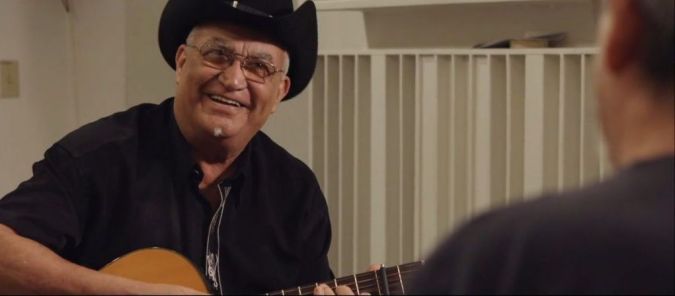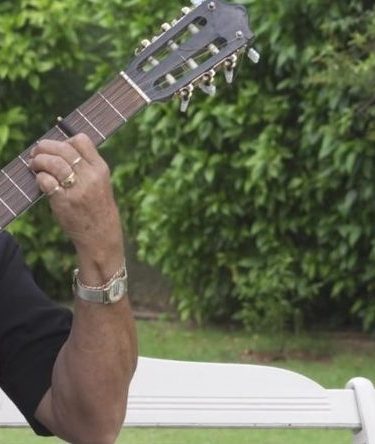Cuban musician Eliades Ochoa may not have the same name recognition as Celia Cruz or Benny Moré, but the songs his guitar shared are probably familiar to many with only a passing idea of what Cuban music sounds like. As one of the core musicians of the Buena Vista Social Club, Ochoa spread the folk roots of Cuban music around the world and helped keep the Cuban son genre alive for generations to come. Now, Cynthia Biestek‘s Eliades Ochoa: From Cuba To The World traces the musician’s journey from a humble farmer’s son to an award-winning star.
Born on the east side of the Caribbean Island, Ochoa credits his family’s sacrifices for the many successes of his career. His father recognized his virtuoso son’s gift early, and moved the family from the hilly countryside of Loma de la Avispa to the city so his son could learn to play guitar from more experienced teachers. To this day, Ochoa favors an eight-string guitar preferred by the countryfolk of the region at the time.
While there’s a lot of traveling in the movie, one of the most candid parts of the documentary’s saga follows Ochoa back to his hometown and the neighboring town where his family plot lies. During his on-camera interview, he reflects back on the many losses he’s suffered, including that of his 21-year-old son. He also explores the idea that someday, he too must die. It’s a somber moment, but true to his Cuban sense of humor; while visiting his future tomb, Ochoa laments that not enough women will lay flowers at his grave because it’s far away.
As it retraces Ochoa’s origin story, Eliades Ochoa: From Cuba To The World also revisits the island’s vibrant musical past, unearthing faded names and echoes of songs we only know from their cover versions. The most famous of which is the towering legacy of Company Segundo, the man behind Buena Vista Social Club’s biggest hit, “Chan Chan.” The idea of gathering aging musicians into a supergroup may have been organized by a non-Cuban producer, but the legacy of Buena Vista Social Club has helped preserve Cuba’s folk songs and introduce the world to musical talents like Ochoa. It’s a legacy with staying power, too. When the U.S. began normalizing relations with Cuba, Ochoa and the surviving members of the Buena Vista Social Club were among those invited to perform in the White House, the first Cuban band to do so in more than half a century.

The documentary splits its time between sit-down interviews with subjects such as Ochoa’s contemporaries, scholars, friends, family and fans. Thanks to its subject, the film lines each frame with music — be it Ochoa’s rapid-fire guitar work or a slower-paced tune he’s fiddling with. From its bare-boned small folk bands and solo troubadours to what these songs sound like with today’s polished instruments and amps, old, scratched recordings are dusted off to give audiences a sampling of what old school Cuban music sounded like. Occasionally, Ochoa wanders off into musical tangents of his career, and the audience is in for the ride. One of these collaborations wasn’t musical, but visual. Ochoa earned some accolades apart from the Buena Vista Social Club by working with famed Cuban animator Juan Padrón, the man behind Vampiros en la Habana, for a music video. The documentary worked with Padrón to use the same computer animated style animation to recreate parts of Ochoa’s story where no footage or archival photos existed, like his memories of when he first started performing in clubs or a chance collaboration with a blues musician.
With his signature black hat and black guayabera, it’s no wonder resident fan Benicio del Toro calls him the Johnny Cash of Cuba. Despite some differences, it’s an apt comparison. Ochoa’s just as dedicated to his music, his roots and the working-class people he still sees himself a part of. The documentary has no shortage of talking heads eager to discuss Ochoa, but sometimes, I wish we could spend more time with the music and watching sleekly shot concert footage of the stoic master ply his trade. That’s when the movie truly feels electric, and it’s most likely Ochoa’s music that brought us to this documentary to begin with.
Eliades Ochoa: From Cuba To The World screened at the Havana Film Festival New York.




